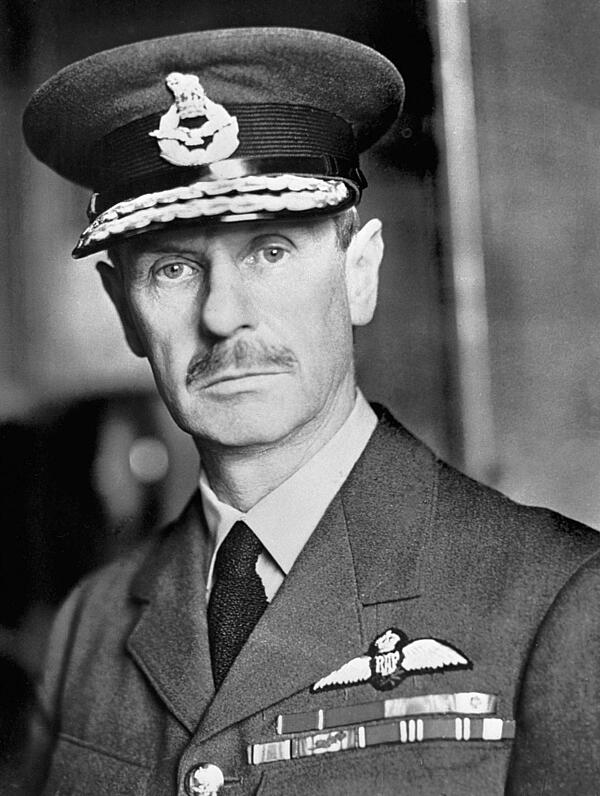Hugh Dowding
Scottish born Hugh Dowding was considered to be one of the most significant military commanders of the prominent Battle of Britain.
Dowding was educated at Winchester College and the Royal Military Academy at Woolwich. During his time in the military he served in Ceylon, Gibraltar, Hong Kong and then India for six years.
When he headed back to Britain after commencing this trip, he began flying and was given his flying license in 1913. Afterwards he became a member of the new Royal Flying Corps and fought in World War One as commander of 16 Squadron. It was in this war that he fell out with General Hugh Trenchard - otherwise known as the head of the Royal Flying Corps - over the issue of more rest for exhausted pilots. Because of this, Dowding got posted back to Britain. He was made brigadier-general but did not participate in the actual war any longer.
When the war was over, Dowding signed up to the newly created Royal Air Force and in 1929 became a vice-marshal. He was promoted to an air marshal in 1933 and received a knighthood the following year.

As a member of the Air Council for Supply and Research, Dowding was a strong advocate for research, development and reform within the RAF. He pushed forward the rapid development of fast, manoeuvrable, all metal monoplane fighters such as the Hurricane and the Spitfire, and from 1935 was encouraging research into radar.
From 1937-1938 Dowding firmly believed war against Nazi Germany seemed very likely, and the Nazis had made a show of the Luftwaffe’s increasing growth. In April 1937, the Luftwaffe had displayed an ability for destroying an undefended city with the bombing of Guernica, Spain. Dowding felt that because of this, Britain needed to be able to protect itself from German bombers so he kept pushing for the development and manufacture of the Spitfire and Hurricane, as well as the radar development to give Britain adequate warning in advance of an enemy attack.
Dowding felt Britain could not defend itself properly against the Luftwaffe in 1938. So he advised Prime Minister Neville Chamberlain to go after an appeasement policy at Munich. Chamberlain is acknowledged to have ‘given in’ to Hitler and did not stand up to him well enough, but Dowding believed he was in need of more time for Fighter Command’s development for Britain’s defense.
Dowding’s biggest test as head of Fighter Command came during the Battle of Britain. Dowding did not agree with other senior RAF officers over tactics - Air Vice Marshal Douglas and Air Vice Marshal Leigh-Mallory wanted Fighter Command pilots to engage with the Luftwaffe before crossing the English coastline. However, Dowding did not acknowledge this as he felt any British or Allied pilot who parachuted over the English Channel had a good chance of drowning. Any combat which happened over the mainland leading to a pilot parachuting out enabled them to have a higher survival rate. Dowding was aware that Fighter Command was not lacking in fighter planes, but it did need more experienced pilots and he came to the conclusion that Fighter Command could not afford to lose any more, so he engaged the Luftwaffe on ‘home’ soil.
The victory of the Battle of Britain put an end to any hope that Hitler may have had while launching ‘Operation Sealion’. Recent revisions of the battle by historians indicate that Hitler was more focused on the attack on Russia, rather than an invasion of Britain. Though no one in Britain would have had knowledge of this in August or September 1940 there could not be any risk that the barges on the French and Belgium northern coastline were only positioned to act as a threat.
The September 1940 victory has been credited to Dowding as well as ‘the few’ and he received the Knight Grand Cross for this - however a lot of people do not feel his career ended in the way it should have. The chief of air staff, Air Chief Marshal Portal, disagreed that Dowding had employed the correct tactics and he was made to retire from his position as head of Fighter Command in November 1940. He was replaced by Big Wing advocate Sholto Douglas.
Hugh Dowding died in Kent on 15 February 1940.
See also: Sir Keith Park
MLA Citation/Reference
"Hugh Dowding". HistoryLearning.com. 2026. Web.
